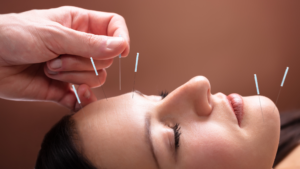
Share
In this Article
| Topic | Summary |
|---|---|
| ADHD in Midlife Women | Look for symptoms like difficulty concentrating, forgetfulness, and feeling overwhelmed. These may be exacerbated by hormonal changes during perimenopause and menopause. |
| Executive Functioning Challenges | Watch for struggles with prioritizing tasks, managing time, and organizing responsibilities. Use tools like planners and reminders to create structure. |
| Social and Emotional Difficulties | Be aware of relationship challenges, emotional intensity, and self-esteem issues. Seek support through therapy or support groups. |
| Diagnosis and Treatment | Consult a healthcare provider experienced in diagnosing ADHD in adult women. Consider a combination of medication, therapy, and lifestyle changes for management. |
| Recommended Services and Products | |
Acupuncture | Acupuncture can complement traditional ADHD treatments by helping balance body and mind, potentially alleviating some symptoms. Read More |
Recovery Body Treatment | The Recovery Body Treatment uses natural ingredients to promote relaxation and improve circulation, which may help with stress management and overall well-being. Buy Now |
As the founder of CARRINNA and a Joyful Aging Expert, I’ve encountered numerous women struggling with undiagnosed ADHD in women. This often-overlooked condition can significantly impact a woman’s life, especially during midlife. In this article, I’ll share insights on recognizing ADHD symptoms in midlife women and offer guidance on seeking proper diagnosis and treatment.
The Hidden Struggle: ADHD in Midlife Women
ADHD in women often goes unnoticed or misdiagnosed, particularly as they enter midlife. The challenges that come with this stage of life can exacerbate existing ADHD symptoms or bring previously manageable ones to the forefront. It’s crucial to understand that ADHD manifests differently in women compared to men, and its presentation can change throughout a woman’s life.

Get expert tips on healthy living and aging gracefully at 40 and beyond from me.
Join Our Spiritual Wellness Journey: Subscribe for Weekly guidance & Insights
Elevate Your Spirit: Receive Transformative Guidance Straight To Your Inbox
Success! Now check your email to confirm your subscription.
The Prevalence of ADHD in Women
Before we dive into the symptoms, let’s consider some statistics:
- Up to 13% of children have ADHD, and most don’t outgrow it. This means at a party with 10 women, at least one likely has or should be diagnosed with ADHD.
- Women diagnosed with ADHD in adulthood are more prone to depression, anxiety, sleep disorders, eating disorders, and substance use.
- Many women with ADHD struggle with low self-esteem due to years of undiagnosed challenges.
These numbers highlight the importance of recognizing and addressing ADHD in midlife women.
Hormonal Changes and Cognitive Symptoms

One of the most significant factors affecting ADHD in women during midlife is the hormonal rollercoaster that comes with perimenopause and menopause. These hormonal fluctuations can intensify ADHD symptoms, making them more noticeable and disruptive.
The Estrogen Effect
As women approach menopause, estrogen levels begin to decline. This hormonal shift can lead to:
- Increased difficulty with focus and concentration
- Heightened forgetfulness
- Feeling overwhelmed more easily
- Mood swings and irritability
These symptoms can be particularly challenging for women who are juggling multiple responsibilities at work and home. The decrease in estrogen can make previously manageable ADHD symptoms feel overwhelming and out of control.
Cognitive Fog and ADHD
Many midlife women experience what’s often referred to as “brain fog” during perimenopause and menopause. For those with ADHD, this cognitive cloudiness can be even more pronounced. You might find yourself:
- Struggling to remember names or appointments
- Having difficulty following conversations
- Feeling easily distracted during important tasks
- Experiencing a sense of mental fatigue
It’s important to note that these symptoms aren’t just “normal aging” or “women’s issues.” They could be signs of ADHD that have been masked or exacerbated by hormonal changes.
Executive Functioning Challenges in Midlife
As we enter midlife, the demands on our executive functioning skills often increase. For women with ADHD, these challenges can become particularly apparent and disruptive.
Juggling Multiple Responsibilities
Midlife often brings a perfect storm of responsibilities:
- Career advancement or career changes
- Caring for aging parents
- Supporting adult children
- Managing household tasks
- Maintaining personal relationships
For women with ADHD, balancing these responsibilities can feel like an insurmountable task. The executive functioning deficits associated with ADHD can make it difficult to:
- Prioritize tasks effectively
- Manage time efficiently
- Organize household and work responsibilities
- Maintain focus on long-term projects
- Adapt to changing schedules and demands
The “Frenzied and Frazzled” Feeling

Many midlife women with ADHD describe feeling constantly “frenzied, frazzled, and overwhelmed.” This state of perpetual overwhelm can lead to:
- Chronic stress and anxiety
- Difficulty relaxing or “turning off” the mind
- Procrastination on important tasks
- Impulsive decision-making to cope with stress
- Emotional dysregulation and mood swings
It’s crucial to recognize that these feelings aren’t a personal failing but rather a symptom of ADHD intersecting with the unique challenges of midlife.
Social and Emotional Difficulties
ADHD doesn’t just affect cognitive functioning; it can also have a significant impact on social and emotional well-being, especially for midlife women.
Relationship Challenges
Women with ADHD may face unique difficulties in their personal relationships:
- Difficulty maintaining long-term friendships due to forgetfulness or inconsistency
- Struggles in romantic relationships due to communication issues or impulsivity
- Challenges in parenting, particularly with organization and consistency
- Feeling overwhelmed by social obligations and expectations
Emotional Intensity and Rejection Sensitivity
Many women with ADHD experience emotions more intensely than their neurotypical peers. This can manifest as:
- Heightened sensitivity to criticism or perceived rejection
- Intense emotional reactions to everyday situations
- Difficulty regulating emotions, leading to mood swings
- Increased vulnerability to anxiety and depression
The Impact on Self-Esteem
Years of undiagnosed ADHD can take a toll on a woman’s self-esteem. By midlife, many women with ADHD have internalized negative messages about their abilities and worth. This can lead to:
- Chronic feelings of inadequacy
- Imposter syndrome in professional settings
- Reluctance to pursue personal goals or dreams
- Self-sabotaging behaviors
Recognizing these emotional and social challenges is crucial for proper diagnosis and treatment of ADHD in midlife women.
Misdiagnosis and Missed Diagnosis: A Common Problem
One of the most significant issues facing midlife women with ADHD is the high rate of misdiagnosis or missed diagnosis. Several factors contribute to this problem:
Masking and Compensation
Many women with ADHD have developed coping mechanisms over the years that can mask their symptoms. These might include:
- Obsessive list-making and planning to compensate for poor working memory
- Overworking to meet expectations and hide difficulties
- Avoiding situations that highlight their challenges
- Relying heavily on support systems to manage daily tasks
While these strategies can be effective in the short term, they often become unsustainable as the demands of midlife increase.
Comorbid Conditions
ADHD in women often coexists with other mental health conditions, which can complicate diagnosis. Common comorbidities include:
- Anxiety disorders
- Depression
- Bipolar disorder
- Eating disorders
- Substance use disorders
Healthcare providers may focus on treating these conditions without recognizing the underlying ADHD.
Gender Bias in Diagnosis
Historically, ADHD has been seen as a condition primarily affecting boys and men. This bias can lead to:
- Dismissal of ADHD symptoms in women as “hormonal” or “emotional” issues
- Lack of recognition of how ADHD presents differently in women
- Insufficient screening for ADHD in women presenting with mood or anxiety disorders
Recognizing ADHD Symptoms in Midlife Women
To address the issue of underdiagnosis, it’s crucial to understand how ADHD typically manifests in midlife women. Here are some key symptoms to look out for:
Inattention and Distractibility
- Difficulty sustaining attention during conversations or meetings
- Easily distracted by external stimuli or internal thoughts
- Trouble completing tasks, especially those requiring sustained mental effort
- Frequently losing important items like keys, phones, or documents
Hyperactivity and Restlessness
While the hyperactivity often associated with ADHD may look different in adult women, it can still be present:
- Feeling constantly “on the go” or driven by an internal motor
- Difficulty sitting still for extended periods
- Fidgeting, tapping, or restless movements
- Talking excessively or interrupting others in conversation
Impulsivity
- Making important decisions without proper consideration
- Engaging in risky behaviors, especially in areas like spending or relationships
- Difficulty waiting one’s turn or interrupting others
- Saying things without thinking, leading to social difficulties
Executive Functioning Issues
- Chronic disorganization at home and work
- Poor time management and frequent lateness
- Difficulty initiating tasks or procrastination
- Trouble prioritizing and multitasking effectively
Emotional Dysregulation
- Mood swings and irritability
- Difficulty managing stress and frustration
- Low frustration tolerance
- Intense emotional reactions that seem disproportionate to the situation
If you recognize several of these symptoms in yourself or someone you know, it may be worth seeking a professional evaluation for ADHD.
Seeking Diagnosis and Treatment
If you suspect you may have ADHD, the first step is to seek a comprehensive evaluation from a healthcare provider experienced in diagnosing ADHD in adult women. This process typically involves:
- A detailed medical and psychological history
- Assessment of current symptoms and their impact on daily life
- Screening for co-occurring conditions like anxiety and depression
- Consideration of hormonal factors and life stressors
Treatment Options
Once diagnosed, there are several treatment options available for midlife women with ADHD:
- Medication: Stimulant and non-stimulant medications can be effective in managing ADHD symptoms. Your healthcare provider can help determine the best option for you, considering factors like hormonal changes and potential interactions with other medications.
- Cognitive Behavioral Therapy (CBT): This type of therapy can help develop coping strategies for managing ADHD symptoms and addressing associated emotional challenges.
- Coaching: ADHD coaches can provide practical support in developing organizational skills, time management techniques, and strategies for managing daily life with ADHD.
- Lifestyle Changes: Regular exercise, a balanced diet, and good sleep hygiene can significantly improve ADHD symptoms.
- Support Groups: Connecting with other women who have ADHD can provide valuable emotional support and practical advice.
Alternative Approaches
In addition to traditional treatments, many women find relief through alternative approaches. At CARRINNA, we offer services that can complement ADHD treatment:
- Acupuncture: Traditional Chinese Medicine approaches, including acupuncture, can help balance the body and mind, potentially alleviating some ADHD symptoms.
- Recovery Body Treatment: Our Recovery Body Treatment uses a blend of natural ingredients to promote relaxation and improve circulation, which may help with stress management and overall well-being.
While these approaches shouldn’t replace medical treatment for ADHD, they can be valuable additions to a comprehensive management plan.
Empowering Midlife Women with ADHD
Living with ADHD as a midlife woman can be challenging, but it’s important to remember that ADHD also comes with unique strengths. Many women with ADHD are:
- Highly creative and innovative
- Empathetic and intuitive
- Energetic and passionate
- Able to hyper-focus on tasks they find engaging
By understanding and embracing these positive aspects of ADHD, women can learn to harness their strengths while managing their challenges.
Strategies for Success
Here are some strategies that can help midlife women thrive with ADHD:
- Embrace Your Unique Brain: Recognize that your ADHD brain works differently, and that’s okay. Find ways to work with your natural tendencies rather than against them.
- Develop a Support System: Surround yourself with people who understand and support you. This might include family, friends, therapists, or ADHD support groups.
- Create Structure: Use tools like planners, apps, and reminders to help manage your time and tasks.
- Practice Self-Compassion: Be kind to yourself when you struggle. Remember that ADHD is a neurological condition, not a personal failing.
- Prioritize Self-Care: Make time for activities that recharge you, whether it’s exercise, meditation, or creative pursuits.
- Educate Your Loved Ones: Help your family and close friends understand ADHD and how it affects you.
- Advocate for Yourself: Don’t be afraid to ask for accommodations at work or in your personal life that can help you manage your ADHD more effectively.
FAQ
Hormonal changes during midlife can significantly impact ADHD symptoms in women. As estrogen levels fluctuate during perimenopause and menopause, many women experience an exacerbation of their ADHD symptoms. This hormonal rollercoaster can lead to increased difficulty with focus, concentration, and emotional regulation.
It’s crucial for midlife women to recognize that their ADHD symptoms may become more pronounced during this time. Seeking support from healthcare providers who understand the interplay between hormones and ADHD can be invaluable in managing these challenges effectively.
One of the most pervasive misconceptions about ADHD in women is that it’s a childhood disorder primarily affecting boys. In reality, ADHD in women is often overlooked or misdiagnosed due to its different presentation. Many women with ADHD are labeled as anxious, depressed, or simply “scatterbrained” when they’re actually dealing with an undiagnosed neurodevelopmental disorder.
Another common myth is that high-achieving women can’t have ADHD. The truth is, many women with ADHD are incredibly successful in certain areas of their lives while struggling in others. This “twice-exceptional” phenomenon can make diagnosis even more challenging, as these women may not fit the stereotypical image of someone with ADHD.
Distinguishing between ADHD symptoms and menopause symptoms can be tricky, as there’s significant overlap. Both conditions can cause memory issues, mood swings, and difficulty concentrating. However, ADHD symptoms typically persist throughout a woman’s life, while menopause symptoms are more cyclical and tied to hormonal changes.
To differentiate, it’s helpful to consider the timeline of symptoms. If cognitive and emotional challenges have been present since childhood or early adulthood, ADHD is more likely. If these issues are relatively new and coincide with other menopause symptoms like hot flashes or irregular periods, they may be more related to menopause. Consulting with a healthcare provider who specializes in both ADHD and women’s health can provide clarity.
Societal expectations significantly impact how women with ADHD experience and manage their condition. Women are often expected to be the primary organizers of family life, maintain a tidy home, and excel in their careers while also being emotionally available. These expectations can create immense pressure for women with ADHD, who may struggle with executive functioning tasks.
The disconnect between societal expectations and the realities of living with ADHD can lead to feelings of inadequacy and shame. Many women with ADHD internalize these struggles, believing they’re personal failings rather than symptoms of a neurodevelopmental disorder. Challenging these societal norms and fostering a more inclusive understanding of neurodiversity is crucial for supporting women with ADHD.
Undiagnosed ADHD in midlife women can have profound effects on mental health. Years of struggling with unrecognized symptoms can lead to chronic stress, anxiety, and depression. Many women develop negative self-perceptions, viewing themselves as lazy or incompetent when they’re actually dealing with an undiagnosed neurological condition.
The lack of proper diagnosis and support can also result in missed opportunities, relationship difficulties, and career setbacks. This accumulation of challenges can significantly impact self-esteem and overall well-being. Recognizing and addressing ADHD in midlife women is crucial for improving mental health outcomes and quality of life.
ADHD symptoms in midlife women often manifest differently than in men. Women are more likely to experience inattentive symptoms, such as difficulty focusing, forgetfulness, and feeling overwhelmed. They may also struggle more with emotional regulation, experiencing intense mood swings and heightened sensitivity to rejection.
Another unique aspect is how ADHD interacts with hormonal changes in midlife women. Many women report that their ADHD symptoms fluctuate with their menstrual cycle and become more pronounced during perimenopause and menopause. This hormonal component is not typically seen in men with ADHD.
Untreated ADHD can have far-reaching effects on the daily lives of midlife women. Many struggle with time management, often running late or missing important deadlines. Household organization can be a significant challenge, leading to cluttered spaces and forgotten tasks. These difficulties can strain relationships with family members and colleagues.
Professionally, untreated ADHD can hinder career advancement. Women may struggle with completing projects, staying organized, or managing multiple responsibilities. This can lead to underemployment or job dissatisfaction. Additionally, the constant stress of trying to keep up with daily demands can lead to burnout and negatively impact overall well-being.
Effective treatment for ADHD in midlife women typically involves a multimodal approach. Medication, such as stimulants or non-stimulants, can be highly effective in managing core ADHD symptoms. However, it’s important to work closely with a healthcare provider to find the right medication and dosage, especially considering potential interactions with hormonal changes.
Cognitive Behavioral Therapy (CBT) tailored for adult ADHD can be incredibly helpful. It teaches strategies for managing time, organizing tasks, and regulating emotions. Many women also benefit from working with ADHD coaches who can provide practical support for daily challenges. Additionally, lifestyle modifications like regular exercise, adequate sleep, and stress management techniques can significantly improve ADHD symptoms.
Gender differences play a significant role in how ADHD presents in adults. Women are more likely to have inattentive-type ADHD, which is characterized by difficulties with focus, organization, and memory. Men, on the other hand, are more often diagnosed with hyperactive-impulsive type ADHD, which involves more visible symptoms like restlessness and impulsivity.
Women with ADHD often internalize their struggles, leading to anxiety and depression, while men may externalize through risk-taking behaviors or aggression. These gender differences in presentation contribute to the underdiagnosis of ADHD in women, as their symptoms may not fit the stereotypical image of ADHD.
Midlife women with ADHD often face unique challenges in the workplace. Many struggle with time management, prioritization, and meeting deadlines, which can be particularly stressful in high-pressure work environments. The need to multitask and handle multiple responsibilities can be overwhelming for women with ADHD, potentially leading to burnout.
Additionally, the symptoms of ADHD can sometimes be misinterpreted in professional settings. Forgetfulness might be seen as a lack of commitment, while difficulty with organization could be perceived as incompetence. These misunderstandings can hinder career advancement and job satisfaction. It’s crucial for workplaces to foster understanding about ADHD and provide accommodations to support employees with this condition.
Conclusion: Embracing Your ADHD Journey
Understanding and managing ADHD as a midlife woman can be a transformative journey. By recognizing the unique ways ADHD manifests in women, seeking proper diagnosis and treatment, and embracing both the challenges and strengths of ADHD, you can lead a fulfilling and successful life.
Remember, you’re not alone in this journey. Many women are discovering their ADHD in midlife and finding new ways to thrive. If you suspect you may have ADHD, don’t hesitate to seek professional help. With the right support and strategies, ADHD doesn’t have to hold you back—it can be a source of creativity, energy, and unique perspective that enriches your life and the lives of those around you.
At CARRINNA, we’re committed to supporting women on their journey to joyful aging, including those navigating the complexities of ADHD. Whether through our acupuncture services or holistic treatments, we’re here to help you find balance and embrace your authentic self.






